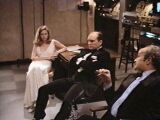Network
1976 US
Dir: Sydney Lumet
Str: Peter Finch, Faye Dunaway, William
Holden, Robert Duvall



Network surely leaves a bad aftertaste.
In a sense, this famous but rather disturbing movie will surely leave a stronger
and much longer lingering unpleasant aftertaste in your mouth even compared to so-called violent movies, though,
of course, the movies that leave an unpleasant aftertaste doesn't necessary mean they are worthless (on the contrary,
being distasteful can be one way of conveying some kind of ideas, I presume), which I think is the case with Network.
Because, in the case of violent movies, you can easily discern what's going on behind those outright physical violent
scenes. Therefore, in general, the scenes they provide can be easily separated from what is actually happening
in your own lives and rather quickly forgotten after the scene has disappeared from before your eyes, though some
persons might fail to do so, and cause some violent scenes in real lives, which was the case with some guys who
actually killed people, being influenced by some relatively recent downright violent movie (I think that was Natural
Born Killers, though I'm not sure). On the other hand, in the case of Network, as TV is the subject,
what is depicted is very difficult to be separated from our own lives. Therefore it would be rather difficult for
viewers to be indifferent to what is happening in the movie.
Network is exaggerating negative aspects too much. But still keeps
some truth.
Anyway, I can imagine that some persons would hate Network completely,
not because of a few violent scenes the movie has, but because of its assertive and exaggerated denunciation for
the negative aspects of TV influence. I, by myself, consider that the movie is exaggerating some negative aspects
too much, even to such an extent as could entirely ruin the movie's reputation as being a serious social drama.
Nevertheless, I value this movie rather highly, mainly because of powerful performances of several renowned players.
Also, the messages the movie is trying to convey is, if being exaggerated, not totally far-fetched and groundless
by any means. Because, these days, the people who live in the country where TV dominates in many ways (my country
Japan is one of such countries) seem to allow mass media including TV to determine their own living styles, even
to such an extent that the imaginary scenes TV creates almost became the sole reality they could think of. Network
places much stress on this aspect, and, if negative, will certainly conjure up some strong reaction in audience's
mind.
What a crazy story!
The story shows a news anchor man (played by Peter Finch). Though once he was
a popular public figure, he has gradually lost his popularity and, as a result, it has become impossible for him
to get decent rating out of his program. Therefore it is natural that the TV station has come to think of firing
him. One night, he announces his cockamamy intention of retiring by killing himself right in the middle of his
program in the next week. As a result of this announcement, he gains such kind of public attention like watching
a freak show. Meanwhile, the news division of that TV station has been constantly losing money, and, the chief
(played by William Holden) feels humiliated when he knows in the annual stockholders meeting that his division
shall be restructured without any notice in advance. In these circumstances, a female staff of this TV station
who considers herself to be very capable of doing anything (played by Faye Dunaway) comes to think they should
utilize Peter Finch's newly acquired popularity by making him some kind of prophet and turning the news show into
a kind of amusement park show in order to recover the rating of the news program. Astonishingly, also she is planning
to launch violent documentary video-movies on TV program, which are to be shot by some terrorist group while they
are actually conducting such violent activities like bank-robberies and kidnappings. Firstly, Finch succeeds in
gaining an incredible amount of public attention. But as he gradually loses his mental balance, he comes to mention
the matter he shouldn't touch on for the sake of company's profit. After he was admonished by the company's president
(played by Ned Beatty), his speech becomes unattractive because he only refers to the things the president wants
him to talk, which is not so good in terms of the program's rating. Thus, the staffs of the program decide to assassinate
him by hiring the aforementioned terrorist group.
TV, as a real time mass media, has created a new mind set.
That is the outline of this film. What a crazy story, don't you think so? But,
somewhat, some way, the story seems to reflect some aspects of modern days, if being ten times exaggerated. For
example, even if the actual TV stations are highly unlikely to hire a terrorist group to make a TV program, it
is likely that news shows have such a requirement that audience's desire for watching unusual matters should be
satisfied by providing the scenes they have never seen before. Furthermore, no matter how strictly ethics restrained
the audience from doing so, audience may well want to watch disastrous scenes to get the relief by confirming they,
themselves, weren't there, though they might not admit it. This kind of mentality was absolutely impossible to
be formed in the era when the introduction of real time mass media like TV was yet to come, for, without the direct
impact from real time effect, all the intensity and momentum enabling audience to feel they too could have been
there would be diluted. In other words, the capability of handling matters in real time and showing them to a vast
number of audience simultaneously has created a new mind set, and it could include craving for violent scenes,
for the intensity of violence can be maximized when handled in real time, and intensity sometimes intoxicates people.
Watching something happen in real time is completely different from hearing or reading something. Before the advent
of TV era, time lag (even newspapers require time lag) could mediate and soften up some intensity a bare fact had.
Therefore, audience were protected by the buffer of time lag from the direct impact of bare facts. This movie's
last scene where Peter Finch is shot by two terrorists in front of huge audience clearly shows this powerful element
TV, as a real time media, has.
TV's ability to juxtapose unusual things and ordinary things could
be very dangerous for all of us.
And one another important aspect shown is, that TV's ability to juxtapose violent
scenes and ordinary things might completely mix up audience's mind in judging what is ordinary and what is unusual.
After the aforementioned last scene, the movie shows several TV monitors, on some of which the assassination scenes
are being shown, and on the others commercials advertising very ordinary products are being shown. Of course, displaying
a murder scene and a commercial in just one display simultaneously shall be impossible unless some kind of subliminal
technique is employed. But, TV can arrange both scenes in chronological proximity. So I think this scene summarizes
this ability very well, and, hence it could be one of the most disturbing scenes in this film. As William Holden
says to Faye Dunaway in a scene, one of TV's major consequences upon its viewers is to lead them to the state indifferent
and callous to everything by bringing down unusual events like bank-robberies and assassinations to the level of
common banality, making them look like freak shows or like ordinary commercials. This kind of equalization process
is very dangerous because human society is based on structural systems, which, in turn, require the mechanism which
enables us to differentiate each individual element. So, to retain the balance of society, unusual things definitely
must be considered unusual. If unusual things became usual, the society itself should be considered to be completely
different from what used to be. Even, in that case, another structure should arise, and differentiate other aspects.
But, TV has the potentiality of entirely destroying this differentiating process itself to place all things in
equal level. I think this very element is the essence of violence; that is, destroying all the systems that has
so far created structural equilibrium needed for retaining the balance of a society, and, as a result of this destruction,
putting all things in a flat level. The reason why I felt disturbed when I watched this movie is probably because
the movie solely extracts this reeking aspect and magnifies it ten times with ignoring all the bright aspects TV
media has.
"I'm as mad as hell. I'm not gonna take this anymore."
I think this review has become too long already at this point. But, I would
like to say one another thing about this movie. In a scene, Peter Finch instigates the audience of his program
to express their anger loudly. This is obviously intended for the audience of this movie Network too. The
movie seems to instigate us to do the same thing as the audience in the movie do; that is, opening an window and
shouting the phrase Peter Finch does. This phrase is "I'm as mad as hell. I'm not gonna take this anymore".
The word "this" in this phrase means just an overall situation, which means there is no concrete objective
this "this" is targeted at. Using the words in the movie, articulating rage by denouncing hypocrisy is
not so natural, for, in this case, the stress is rather placed on articulating rage than on denouncing hypocrisy.
In other words, denouncing hypocrisy is just a method of articulating rage. Before this movie was made, there had
been always a concrete objective a particular rage was targeted at. For example, Vietnamese war, or Watergate,
or something like that. So the movies handling such issues had always come up with some concrete target into which
audience's indignation could be channeled, which means articulating rage as an act had been considered to be the
result or the method of some denunciation activity; that is, the other way around of the case of Network.
I think this is another aspect that makes this movie more disturbing, for it provokes some inexplicable anger and
anxiety in audience's mind without showing any target by the accusation of which they might be able to get some
catalysis. Though, of course, you can resent the movie's presumptuousness at any time, that won't do you any good.
In spite of all of this, Network still remains as an excellent movie.
So far I might have given you only the impression this film is very disturbing
and dreary. Nevertheless the movie is highly recommendable. One reason is, as I said before, what is said is not
totally groundless, and you will be able to notice the problem mass media like TV might cause. To tell the truth,
there are several other aspects I would like to talk about this movie, which I dare not do because this review
has already become too long. Anyway, Network is one of the most thought-provoking movies ever made with
regard to mass media issues. Besides, the performances of Peter Finch, Faye Dunaway, William Holden, Robert Duvall,
and Beatrice Straight (though I've never seen her outside in Network) is incredibly powerful. If you don't
like discussing very complicated matters like the nature of mass media, still you will be able to enjoy powerful
performances from those eminent actors and actresses.





